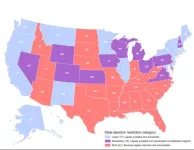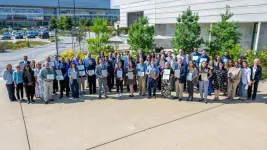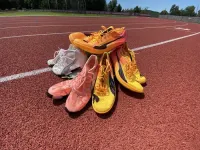(Press-News.org) (Santa Barbara, Calif.) — With freshwater becoming an ever scarcer resource, desalination of ocean water is increasingly employed to bridge the gap between supply and demand. However, desalination is energy-intensive, often powered by fossil fuels, so meeting the need for freshwater can exacerbate the challenge of reducing atmospheric CO2, the main driver of climate change.
Yangying Zhu, an assistant professor in the Department of Mechanical Engineering at UC Santa Barbara, wants to address that conundrum. Now, a two-year, $500,000 seed grant from the Advanced Research Projects Agency-Energy (ARPA-E) within the U.S. Department of Energy (DOE) will make it possible for her to start the work. The grant was provided as part of Inspiring Generations of New Innovators to Impact Technologies in Energy (IGNIITE 2024) a new ARPA-E program focused on supporting early-career scientists and engineers to convert disruptive ideas into impactful energy technologies, with an eye toward bringing promising technologies to market.
“It’s not the typical kind of funding from ARPA-E, which usually gives much larger grants that require multiple PIs and industry collaboration,” Zhu said, adding that this is the first time the agency has funded early-career single-investigator research. “Instead of being solely focused on fundamental discoveries, this one is focused on supporting ideas that align with the ARPA-E mission of improving energy efficiency and sustainability for the United States.” The agency received 400 applications for the highly competitive grants, selecting 23 for funding. Of those, 13 were from academia, with the rest in industry, startups and national labs.
“Securing one of the first-ever ARPA-E single-researcher grants is a tremendous achievement for Zhu, one of our extraordinary junior faculty members,” said College of Engineering Dean Umesh Mishra. “It reflects so well both on her and on the college, where we support one another in effective and timely ways, including with small seed grants like the one she received that provided a spark for this idea. We are extremely proud of this major accomplishment and now look forward to the evolution of the important energy-saving technology she will pursue.”
“It’s surreal to be in the first group to receive these awards,” Zhu said. “I feel very lucky to have been selected after a demanding application process that involved submitting a concept paper, giving an in-person poster and presentation about the proposal and then submitting a full proposal.”
The rigorous process reflects how seriously ARPA-E takes energy efficiency, as well as the significant long-term support it is prepared to provide for technologies that appear promising after the seed-grant stage.
Zhu has two main objectives in her project. “We first want to improve the energy efficiency of the thermal distillation desalination process compared to the current state of the art,” she said. “Second, we want to use renewable energy — either solar or waste heat from industry, such as that from power plants and data centers — to power the process. So, we are targeting both energy efficiency and reduced dependence on fossil fuels.”
To do that, Zhu, who has expertise in heat and mass transfer, plans to develop “a novel architecture” that optimizes both of those elements for the desalination process, she said. “Our targetis two times the energy efficiency, which would reduce energy consumption by half.”
Conventional thermal distillation, which is accomplished by evaporating saltwater to obtain pure water vapor and then condensing the vapor back to liquid, consumes thermal energy to heat the bulk saltwater for distillation. Zhu is proposing to engineer microstructured materials that will enable the system to achieve evaporation by delivering heat directly to the liquid-vapor interfaces, without relying on energy-intensive heat transfer through the bulk fluid.
As Zhu and her team develop their efficient thermal-distillation process, she will also receive support from ARPA-E scientists and experts in business. “I look forward to learning from the experts within ARPA-E for the next two years,” she said.
That interaction includes an annual weeklong visit to ARPA-E headquarters in Washington, D.C., to network with agency experts who support the program. “I hope that with the mentorship and support from ARPA-E this project will grow into a sustainable long-term collaboration,” Zhu said. “I’m also very excited to receive mentorship from ARPA-E in terms of technology-to-market transfer because junior faculty usually don't have a lot of experience with that.”
The project might not have happened, Zhu noted, if not for an initial $50,000 seed grant she received from the Institute for Energy Efficiency at UCSB in 2021, which provided support for a postdoctoral researcher who worked with her on the initial proof of concept. Also critical was a California Nanosystems Institute (CNSI) Climate Innovation postdoc fellowship in 2023, which helped Zhu and her team generate preliminary data on market feasibility. “I'm really grateful for these campus seed-grant opportunities,” she said. “They're not big, but they get you time to think and some freedom to pursue the idea.”
Those smaller grants positioned Zhu to receive this new ARPA-E grant, which gives her a shot at expanded future support should the project go well, and the distinct opportunity to make significant gains in the efficiency of desalination technologythat will likely play a critical role in the future.
END
Making desalination more efficient, by way of renewable energy
UC Santa Barbara mechanical engineering professor Yangying Zhu receives the inaugural IGNIITE grant
2024-09-04
ELSE PRESS RELEASES FROM THIS DATE:
Preventing car battery fires with help from machine learning
2024-09-04
One of the most critical safety concerns for electric vehicles is keeping their batteries cool, as temperature spikes can lead to dangerous consequences.
New research led by a University of Arizona doctoral student proposes a way to predict and prevent temperature spikes in the lithium-ion batteries commonly used to power such vehicles.
The paper "Advancing Battery Safety," led by College of Engineering doctoral student Basab Goswami, is published in the Journal of Power Sources.
With the support of $599,808 from the Department of Defense's Defense Established Program to Stimulate Competitive Research, Goswami and his adviser, aerospace ...
Heavy metal cadmium may be tied to memory issues for some
2024-09-04
MINNEAPOLIS – The heavy metal cadmium, which is found in the air, water, food and soil, is known to cause health problems. A new study published in the September 4, 2024, online issue of Neurology®, the medical journal of the American Academy of Neurology, examined if thinking and memory skills were associated with cadmium exposure. They found no association when they looked at the group as a whole. However, when looking at Black and white people separately, it found cadmium may be tied to problems with thinking and memory skills in white people. ...
Strictest abortion-ban states offer least family support
2024-09-04
View a breakdown of the abortion restrictions by state below
States with early abortion bans are less likely to offer paid time off after childbearing, to give poor children nutritional support or to expand access to reproductive health care
Marginalized people and those with low socioeconomic status are overrepresented in ban states and least likely to overcome the barriers that bans impose
CHICAGO --- States with the most severe post-Dobbs abortion restrictions also have the fewest policies in place to support raising families, reports a new Northwestern Medicine study.
“We found that in the states that most severely ...
Study: People facing life-or-death choice put too much trust in AI
2024-09-04
In simulated life-or-death decisions, about two-thirds of people in a UC Merced study allowed a robot to change their minds when it disagreed with them -- an alarming display of excessive trust in artificial intelligence, researchers said.
Human subjects allowed robots to sway their judgment despite being told the AI machines had limited capabilities and were giving advice that could be wrong. In reality, the advice was random.
“As a society, with AI accelerating so quickly, we need to be concerned about the potential for overtrust,” said Professor Colin ...
Leaders of ‘EV Ready’ Illinois cities recognized in ceremony at Argonne
2024-09-04
City leaders who are working to accommodate more electric vehicles (EVs) were recognized in a ceremony o Aug. 23 at the U.S. Department of Energy’s (DOE) Argonne National Laboratory. Utility ComEd and the Metropolitan Mayors Caucus spotlighted 12 communities in northern Illinois that recently completed the EV Readiness Program.
The EV Readiness Program trains and assists local government officials in taking concrete steps to support EV adoption. As a national leader in EV research, ...
Survey shows nearly 70% of US hospitals affiliated with medical schools host a fast-food restaurant; Chick-fil-A, McDonald’s among most common
2024-09-04
WASHINGTON, D.C.—A new survey by the Physicians Committee for Responsible Medicine published in the American Journal of Lifestyle Medicine reveals that 69.2% of U.S. hospitals affiliated with a medical school host at least one fast-food restaurant. The five most common fast-food restaurants located in hospitals were Starbucks, Subway, Chick-fil-A, Au Bon Pain, and McDonald’s.
“Making fast food like cheeseburgers and fried chicken available in hospitals is hazardous to the health of patients, visitors, and staff,” says Zeeshan Ali, PhD, the lead author of the paper and a nutrition program specialist with the Physicians Committee. “Hospitals ...
Study solves testosterone’s paradoxical effects in prostate cancer
2024-09-04
DURHAM, N.C. – A treatment paradox has recently come to light in prostate cancer: Blocking testosterone production halts tumor growth in early disease, while elevating the hormone can delay disease progression in patients whose disease has advanced.
The inability to understand how different levels of the same hormone can drive different effects in prostate tumors has been an impediment to the development of new therapeutics that exploit this biology.
Now, a Duke Cancer Institute-led study, performed ...
New UMass study shows that ‘super spikes’ can increase track running speed by 2%
2024-09-04
New research published in the Journal of Sport and Health Science led by the University of Massachusetts Amherst shows that super spikes, scientifically described as advanced footwear technology (AFT) spikes, can give runners about a 2% edge in middle-distance track races, like the 800- and 1,500-meters.
“Track athletes started wearing super spikes about five years ago and they are now commonplace in elite track races,” says Wouter Hoogkamer, assistant professor of kinesiology at UMass Amherst and senior author ...
Department of Energy announces $118 million for Energy Frontier Research Centers
2024-09-04
WASHINGTON, D.C. -Ten Energy Frontier Research Centers (EFRCs) designed to bring together world-class teams of scientists for groundbreaking fundamental research have been funded in nine states by the U.S. Department of Energy (DOE).
Since 2009, EFRCs have brought together diverse, world-class teams of scientists to perform basic research that accelerates ground-breaking scientific advances underlying energy technologies.
The centers develop powerful new tools for characterizing, understanding, modeling, and manipulating matter, while training the next-generation scientific workforce by attracting talented students passionate about energy science.
“Fundamental ...
ACC Quality Summit highlights critical value of ACC accreditation and NCDR services
2024-09-04
The American College of Cardiology (ACC) Quality Summit 2024 will take place on September 17-19 in San Antonio, bringing together cardiovascular leaders from across the nation to discuss the value of NCDR services and quality programs.
“ACC’s Quality Summit puts the spotlight on the value of ACC Accreditation and NCDR services for improving health care quality across all health systems,” said ACC Quality Summit Chair Olivia N. Gilbert, MD, MSc, FACC, and Director of Quality and Value for Cardiovascular Medicine at Atrium Health Wake Forest ...
LAST 30 PRESS RELEASES:
Microalgae-derived biochar enables fast, low-cost detection of hydrogen peroxide
Researchers highlight promise of biochar composites for sustainable 3D printing
Machine learning helps design low-cost biochar to fight phosphorus pollution in lakes
Urine tests confirm alcohol consumption in wild African chimpanzees
Barshop Institute to receive up to $38 million from ARPA-H, anchoring UT San Antonio as a national leader in aging and healthy longevity science
Anion-cation synergistic additives solve the "performance triangle" problem in zinc-iodine batteries
Ancient diets reveal surprising survival strategies in prehistoric Poland
Pre-pregnancy parental overweight/obesity linked to next generation’s heightened fatty liver disease risk
Obstructive sleep apnoea may cost UK + US economies billions in lost productivity
Guidelines set new playbook for pediatric clinical trial reporting
Adolescent cannabis use may follow the same pattern as alcohol use
Lifespan-extending treatments increase variation in age at time of death
From ancient myths to ‘Indo-manga’: Artists in the Global South are reframing the comic
Putting some ‘muscle’ into material design
House fires release harmful compounds into the air
Novel structural insights into Phytophthora effectors challenge long-held assumptions in plant pathology
Q&A: Researchers discuss potential solutions for the feedback loop affecting scientific publishing
A new ecological model highlights how fluctuating environments push microbes to work together
Chapman University researcher warns of structural risks at Grand Renaissance Dam putting property and lives in danger
Courtship is complicated, even in fruit flies
Columbia announces ARPA-H contract to advance science of healthy aging
New NYUAD study reveals hidden stress facing coral reef fish in the Arabian Gulf
36 months later: Distance learning in the wake of COVID-19
Blaming beavers for flood damage is bad policy and bad science, Concordia research shows
The new ‘forever’ contaminant? SFU study raises alarm on marine fiberglass pollution
Shorter early-life telomere length as a predictor of survival
Why do female caribou have antlers?
How studying yeast in the gut could lead to new, better drugs
Chemists thought phosphorus had shown all its cards. It surprised them with a new move
A feedback loop of rising submissions and overburdened peer reviewers threatens the peer review system of the scientific literature
[Press-News.org] Making desalination more efficient, by way of renewable energyUC Santa Barbara mechanical engineering professor Yangying Zhu receives the inaugural IGNIITE grant




